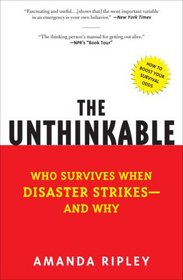Helpful Score: 4
This was an amazing book, a word I don't use lightly. It was not another book about gory details of various disasters and how sad they were. Yes, various disasters were covered, from 9/11 to car accidents, earthquakes, hurricanes, tsunamis, fires, floods, school shootings, airline crashes and others, but gory details were few.
The main focus of this book is how human beings think during a time of disaster -- the phases their minds go through, how some people lose the ability to see temporarily under duress, the psychological processes that the human brain undertakes during an emergency. Knowing those processes enables the reader to think about their own responses, and potentially enable their own survival during an emergency. Both survivors and rescuers were interviewed for this book, to enable us to understand their thinking processes.
The most compelling information I gleaned from this book is that emergency procedures are set up for administrators, not victims, which is easy to see when you think about it, but leaves most of us out of the loop when it comes to safeguarding our own safety. I am a former EMT and medical librarian, and I recommend this title very highly to anyone and everyone.
The main focus of this book is how human beings think during a time of disaster -- the phases their minds go through, how some people lose the ability to see temporarily under duress, the psychological processes that the human brain undertakes during an emergency. Knowing those processes enables the reader to think about their own responses, and potentially enable their own survival during an emergency. Both survivors and rescuers were interviewed for this book, to enable us to understand their thinking processes.
The most compelling information I gleaned from this book is that emergency procedures are set up for administrators, not victims, which is easy to see when you think about it, but leaves most of us out of the loop when it comes to safeguarding our own safety. I am a former EMT and medical librarian, and I recommend this title very highly to anyone and everyone.
Helpful Score: 2
This was an amazing book, a word I don't use lightly. It was not another book about gory details of various disasters and how sad they were. Yes, various disasters were covered, from 9/11 to car accidents, earthquakes, hurricanes, tsunamis, fires, floods, school shootings, airline crashes and others, but gory details were few.
The main focus of this book is how human beings think during a time of disaster -- the phases their minds go through, how some people lose the ability to see temporarily under duress, the psychological processes that the human brain undertakes during an emergency. Knowing those processes enables the reader to think about their own responses, and potentially enable their own survival during an emergency. Both survivors and rescuers were interviewed for this book, to enable us to understand their thinking processes.
The most compelling information I gleaned from this book is that emergency procedures are set up for administrators, not victims, which is easy to see when you think about it, but leaves most of us out of the loop when it comes to safeguarding our own safety. I am a former EMT and medical librarian, and I recommend this title very highly to anyone and everyone.
The main focus of this book is how human beings think during a time of disaster -- the phases their minds go through, how some people lose the ability to see temporarily under duress, the psychological processes that the human brain undertakes during an emergency. Knowing those processes enables the reader to think about their own responses, and potentially enable their own survival during an emergency. Both survivors and rescuers were interviewed for this book, to enable us to understand their thinking processes.
The most compelling information I gleaned from this book is that emergency procedures are set up for administrators, not victims, which is easy to see when you think about it, but leaves most of us out of the loop when it comes to safeguarding our own safety. I am a former EMT and medical librarian, and I recommend this title very highly to anyone and everyone.




